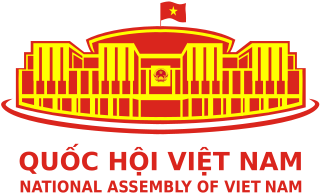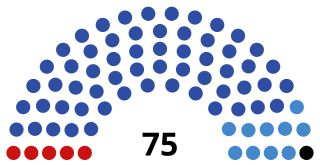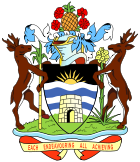
The Standing Committee of the National People's Congress (NPCSC) is the permanent body of the National People's Congress (NPC), the national legislature of China. Although the parent NPC officially has superiority over the Standing Committee, and certain authorities are not delegated, the Standing Committee is generally viewed to have more de facto power, as the NPC convenes only once a year for two weeks, leaving its Standing Committee the only body that regularly drafts and approves decisions and laws.

The speaker of the Lok Sabha is the presiding officer and the highest authority of the Lok Sabha, the lower house of the Parliament of India. The speaker is elected generally in the first meeting of the Lok Sabha following general elections. Serving for a term of five years, the speaker is chosen from sitting members of the Lok Sabha.

A Local Council (LC) is a form of local elected government within the districts of Uganda.

The Assembly of the African Union, which is formally known as the African Union Assembly of Heads of State and Government (AU-AHSG), is one of several decision-making bodies within the African Union. The other bodies are the Pan-African Parliament; the Executive Council, consisting of foreign ministers of the AU members states; and the African Union Commission. The Assembly of the African Union consists of the 55 heads of state and government of the member countries. The Assembly meets once a year.

The National Assembly or Rastriya Sabha is the upper house of the Federal Parliament of Nepal, the lower house being the House of Representatives. The composition and powers of the Assembly are established by Part 8 and 9 of the Constitution of Nepal. There are a total of 59 members: 8 members are elected from each of the seven provinces by an electoral college of each province, and three are appointed by the President on recommendation of the government.

The Local Government Act 1894 was an Act of the Parliament of the United Kingdom that reformed local government in England and Wales outside the County of London. The Act followed the reforms carried out at county level under the Local Government Act 1888. The 1894 legislation introduced elected councils at district and parish level.

The Parliament of Antigua and Barbuda consists of the King of Antigua and Barbuda, the Senate and the House of Representatives.

The National Assembly of the Socialist Republic of Vietnam is the parliament and the highest body of state power of Vietnam. The National Assembly is the only branch of government in Vietnam and, in accordance with the principle of unified power, all state organs are subservient to it.

The Barbuda Council, officially the Council of Barbuda, is a local authority that manages the internal affairs on the island of Barbuda. The council has the authority to buy, acquire, hold, mortgage, and dispose of land and other property. It also possesses a common seal and perpetual succession. The Barbuda Council, which has the authority outlined in the Barbuda Local Government Act, is the government of the island and its coastal zone. The members of the Senate who meet the requirements outlined in paragraph (1) of section 6 of the Barbuda Local Government Act, nine elected members, and the member of the House of Representatives from the Barbuda constituency make up the Council. A Commonwealth citizen who is eighteen years of age or older, was born in Barbuda, is the child of parents who were at least one of their parents' birthplaces, or who has lived in Barbuda for at least three years prior to the date of their nomination for election, and who is a regular resident of Barbuda and a registered voter under the Representation of the People Act are all required to be eligible to be elected as a member of the Council.

The Punjab Legislative Assembly or the Punjab Vidhan Sabha is the unicameral legislature of the state of Punjab in India. The Sixteenth Punjab Legislative Assembly was constituted in March 2022. At present, it consists of 117 members, directly elected from 117 single-seat constituencies. The tenure of the Legislative Assembly is five years unless dissolved sooner. The Speaker of the sixteenth assembly is Kultar Singh Sandhwan. The meeting place of the Legislative Assembly since 6 March 1961 is the Vidhan Bhavan in Chandigarh.

The State Council of Crimea is the parliament of Russian administered Republic of Crimea. It claims to be a continuation of the 'Supreme Council of Crimea' following a vote by the Ukrainian parliament to dissolve the Supreme Council of Crimea. The Parliament is housed in the Parliament building in the centre of Simferopol.

The Maharashtra Legislative Council or Maharashtra Vidhan Parishad is the upper house of the bicameral legislature of Maharashtra state in western India.

Speaker of the House of Representatives of Antigua and Barbuda is the presiding officer in the House of Representatives of Antigua and Barbuda. Prior to conducting any other business, the House must elect a Speaker at its first session following a general election. If the position of Speaker becomes vacant at any point before the next dissolution of Parliament, the House must elect a replacement as soon as is practically possible. The Speaker may be chosen from among House members or from among individuals who are not House members but are eligible to serve in that capacity. Before conducting any other business other than electing the Speaker during the first meeting following a general election, the House shall elect a member to serve as Deputy Speaker. If the position of Deputy Speaker becomes vacant at any point prior to the next dissolution of Parliament, the House shall, as soon as is practically possible, elect another member to fill the vacancy. A minister or parliamentarian cannot be elected as the speaker or deputy speaker of the house by the house. When the position of Speaker is open, the House may not conduct any business.
The municipal year is a period used by local government in the United Kingdom. The municipal year usually begins in May, following any local elections. It is not a fixed date so the number of days in any municipal year varies.

The National Election Commission is independent constitutional institution in South Korea, established to manage free and fair elections, national referendums and other administrative affairs concerning political parties and funds. The agency was established in accordance with Article 114 of the Constitution of South Korea. The NEC has equal status as highest constitutional institution as National Assembly, the Executive Ministries, the Supreme Court and the Constitutional Court. This highly independent status of NEC reflects national will to overcome past histories such as election rigging of South Korea in 1960.
Barangay elections in the Philippines were held on May 14, 2018. The election elected the Punong Barangay, more commonly known as barangay captains, and members of the Sangguniang Barangay, or barangay council, in 41,948 barangays (villages) throughout the country whose terms start on June 30, 2018. Barangays are the smallest local government unit in the Philippines.

The Chairperson of the Barbuda Council is the leader of the Barbuda Council. Established by the Barbuda Local Government Act of 1976, the first council election was on March 22, 1979.

Administrative structures for municipal governments can be found on Antigua and Barbuda. It also has 17 district councils in addition to its workforce for the local government. Under the direction of the Local Government Officer, the district councils have been categorized into a total of four (4) distinct zones. At a more fundamental level, Voluntary Village Councils are strongly urged to encourage the participation of as many citizens as is humanly practicable. After that, they are consolidated into several district councils. The borders of national constituencies are mirrored in district council limits. The island of Barbuda was granted a unique status, and it was given the authority to solicit financial contributions in order to meet the needs of its inhabitants.

The Barbuda Council has committees that may be created by the by-laws of the council or under the Barbuda Local Government Act that are responsible for departmentalising the functions of the council and delegating the tasks of the council.



















